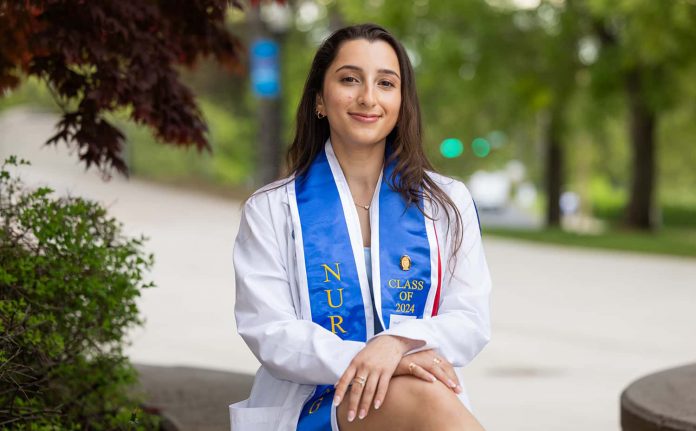Nearly two decades ago in the mountainous city of Medellin, Colombia, three-year-old Sara Bernal-Garcia and her parents left behind the life they knew to pursue their version of the American dream.
Their transition, like that of many others, was marked by unexpected setbacks, including the aftermath of the 9/11 attacks. Despite holding advanced degrees in speech pathology and sociology, respectively, Bernal-Garcia’s mother and father found themselves working as laborers to make ends meet in their new country — a hardship outweighed by their hope of giving their daughter a better life.
On Friday, May 17, 2024, they saw their hope manifest as Bernal-Garcia crossed the commencement stage and received her Bachelor of Science degree in healthcare studies and nursing. Worth noting – this wasn’t the first degree earned by Bernal-Garcia. She also managed to complete all the requirements for a B.S. in Spanish with a concentration in health and human professionals last year.
Suffice it to say, the excitement in her family is palpable.
“They’re very excited – perhaps even more excited than I am,” laughs Bernal-Garcia.
While you’d never know it judging by the thoroughness of her transcript, the inspiration to become a nurse came gradually to Bernal-Garcia. Growing up as a DREAMer and DACA recipient, she frequented community health centers for medical care and found herself surrounded by individuals with similar immigration statuses. The experience introduced her to a steadfast crew of healthcare workers who committed themselves to underserved populations.
“There’s not really a moment I can pinpoint when I knew I wanted to be a nurse,” says Bernal-Garcia. “But I think knowing that there’s healthcare workers out there who work with people specifically in those populations inspired me to want to do the same. I want to help anyone who may not be as fortunate.”
But first, Bernal-Garcia had to face down her biggest obstacle: achieving U.S. residency — a long and arduous process 19 years in the making.
And one that inopportunely overlapped with the start of her junior year.
“The immigration process is very, very long and it’s case by case,” says Bernal-Garcia. “I got to travel back to Colombia for the first time since I was a baby, and that was something I really wanted to do. But I had to stay for a really long time because the legalization process is so long. And they don’t have a set date, so you have to wait for your documents to come back before you can leave the country again.”
Without any way of knowing when she would be able to return to the States, Bernal-Garcia began to wonder whether she might be better off waiting until the fall to return to her degree, but her friends and professors weren’t about to let her slip through the cracks.
“As an immigrant who was fortunate to come to the U.S. when obtaining residency papers was relatively easy, I recognize how many people haven’t been as lucky and have had their lives on hold for years,” said Maria Krol, chairperson for the School of Nursing.
“I remember that I was going to withdraw,” Bernal-Garcia recalls, “but everybody was really patient and trying to work with me because this is a unique situation. It helped that Dr. Krol understands firsthand.”
Not only did Bernal-Garcia stay the course and succeed academically, she also co-founded the UndocuAlly Student Alliance, a supportive community for undocumented students, refugees, and those with Temporary Protected Status (TPS). Her leadership earned her the Cesar Chavez Excellence Award this May.
Now, as an official U.S. resident and with graduation in her rear view, Bernal-Garcia is poised to begin working in the float pool at Middlesex Hospital this summer. The opportunity will give her continued exposure to a variety of clinical environments while she settles into career life.
Eventually, she intends to earn her master’s degree on the path toward becoming an Advanced Practice Registered Nurse (APRN). The credentialing would bring her journey fully around to the cycle of care she experienced.
“My favorite part about nursing is when I get to go to clinical, and when I get to speak with patients in Spanish,” said Bernal-Garcia. “I know how tough that may be when you’re sick, and you can’t really speak the language. It’s hard. But when I see patients’ faces, when I start to speak with them in Spanish and how like their face lights up — you get that sense of community. I really appreciate that.”
“Sara is an extraordinary young woman who has faced many challenges and used her experiences to help others,” adds Krol. “Her ability to empathize with the obstacles people face will make her an exceptional nurse.”


